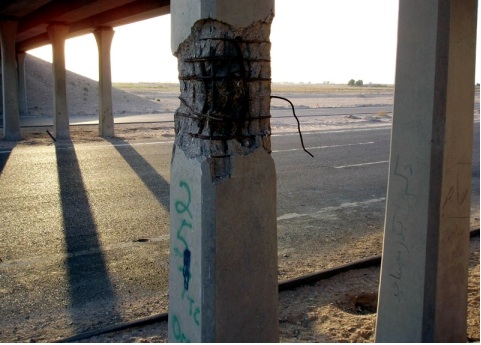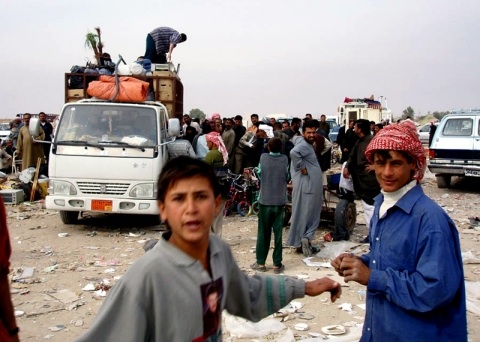During the year I served in the town of Safwan, Iraq, our unit provided armed escort to military and civilian convoys throughout all of Iraq, meeting convoys at Safwan’s border crossing point and taking them on about a 1.5 mile loop along a two-lane town road between the border and the main highway just north of the city. (This convoy activity forms a backdrop for my novel One Hundred and One Nights). After that point the vast majority of the remainder of our routes used such fast-moving roads. Our convoys slowed down on this one stretch, sometimes waiting for another convoy to clear through the border point, sometimes just congested in general. As a result, a troublesome trend toward piracy sprang up along this road, with a few bandits seizing the opportunity, jumping into vehicles, ejecting the drivers and hurrying away before our widely-dispersed guardian Humvees could react (30 semis in a convoy = a virtual moving wall of trucks, for which 3 Humvees provided only a thin guard).
The Not Quite Right of this post hopes to capture the absolute mastery of the driving of these semis, the types of roads down which the bandits took these hulking vehicles, and also the elegant little solution we put in place.

An armored engineer vehicle emplaces a simple serpentine barricade on a road that 'seems' as if it would already have been impossible for a semi to use!
Here, in the photo, one can see the types of road and the woeful emptiness of the land into which the semis were driven (click photo to enlarge). It might seem easy, perhaps, to find something like a semi in so much waste but the land was pitted with little quarries, rills of rock, hard-scrabble dunes. A few tarps slung over a truck, a few shovelfuls of earth and dust, and no one would ever notice it. Then, in the night, the truck might be driven north to a larger city, dismantled, scrapped, its cargo sold, and a neat little profit — a huge profit in comparison to the average Iraqi salary at that time! — made by the thiefs. No one ever got injured during these filchings, the TCN (third-country national — Pakistani, Sri Lankan, Afghani, Indian, etc) drivers usually walking back to the border crossing, maybe with a lump on their head from getting shoved out of the vehicle. But the thefts were annoying and escalating in frequency.
Our solution, proposed by one of my soldiers and at first seeming to be crazy and unworkable, was to wall-in this one lane bypass road all the way from the border to the main, fast-moving highway. While the initial problem with this idea — the restriction of legitimate local traffic moving from one side of the town to the other — nixed the possibility of an outright wall, the final plan, to put barricades in place around which a small car or truck could easily navigate but through which a semi could not be driven, was brilliant in both its feasibility and its cost-effectiveness. The semis couldn’t be driven across the open countryside, with its knee-high mud and clay farm walls, so we didn’t need to worry about blocking anything except the few adjoining roads. We created something akin to the opposite of a roadblock, meant to restrict semis to a known and approved path but to let every other sort of vehicle move with only minimal hindrance.
The idea reduced thievery to almost nothing during the course of our remaining missions in the town, at least for the period of a half year or so, until the thieves adapted and started to carve new and hidden roads in the desert! A game of cat and mouse during which not a single shot was fired.








